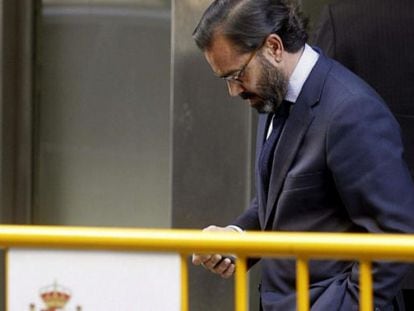“Going to brothels after dinner was normal at the SGAE”
Imprisoned ex-official at Spain’s scandal-hit copyright collection agency tells his side of story in new book

Pedro Farré’s job was once to fight digital piracy and handle corporate relations for the SGAE, Spain’s biggest copyright collection society. As part of that job he also regularly frequented brothels with clients and potentially useful contacts. His company credit card covered the costs: around €39,552 between November 2008 and May 2009.

In January 2016, Farré began a 30-month prison term for misappropriation of funds and document forgery. But between sentencing in 2014 and reporting to jail, Farré wrote a book about his experiences at SGAE in which he asks a number of questions, among them: why is he the only senior official of the scandal-hit organization to have spent time behind bars?
Some of the answers to that question are to be found in Cazado (Hunted), which has just been published two months ahead of Farré’s conditional release: “That is, if the book doesn’t make matters worse,” he jokes.
Farré refuses to point the finger at others in the organization
Farré found himself in trouble after several board members of the SGAE, including chairman Teddy Bautista, were arrested in 2011 following a Civil Guard investigation into a scheme to divert tens of thousands of euros through companies that provided non-existent services.
The former head of corporate relations at SGAE describes his decision to write the book as a “catharsis.”
“I needed to write it to put everything in order. I promised myself I would be sincere, self-critical and humble. It is also a thriller, about the atmosphere within the organization and in Spain: there are spies, dossiers, leaks and corruption,” says Farré.
There is also a cast of characters that include a detective on his trail and a journalist who is threatening him. Also mentioned are four Spanish prime ministers, along with former Popular Party treasurer Luis Bárcenas, who is at the center of sprawling corruption case involving six regional governments and nearly 200 official suspects. Iñaki Urdangarin, the Spanish king’s brother-in-law, who has just been found guilty of corruption, also features. At the same time, there are plenty of stories about what goes on behind the scenes in the higher echelons of power.
The SGAE has yet to recover from the scandal
At the heart of Cazado there is a contradiction. On the one hand, Farré talks about a “new Inquisition,” suggesting the existence of a conspiracy and insisting that “only the small fry” end up in jail, describing himself as “a small piece on the board.”
He accepts responsibility and is sorry for what he did, but also points out: “Going to brothels after dinner was normal. Those places were full of people wearing ties. It didn’t look normal to me until I joined the SGAE.” He mentions evenings, and not just in Spain, that involved prostitutes and meals at “pornographic prices,” adding that being part of the establishment gave him a certain feeling of impunity and that he could get away with anything.
The SGAE has yet to recover from the scandal, and Farré says that while it has done a lot of good in previous years, it made three main mistakes: in the fight against piracy, in defense of the digital canon, a tax levied on all electronic recording devices to compensate authors and creators from the money they lose as a result of private copying, and from which the SGAE received millions of euros; and through Arteria, a property portfolio begun under Bautista.
“We didn’t realize what we were getting into. Television networks, hotels and restaurants, technology giants: having so many enemies at the same time is not sustainable.”
While Farré says he heard rumors during his time at SGAE of possible wrongdoing, he’s not going to name any names. Asked if he saw members of the body politic, police or judiciary in brothels, he insists that he did not. Similarly, although he says he is “not the best example of corruption” in the SGAE, he refuses to point the finger at others in the organization.
“There were other credit cards. I don’t have to reveal the names of the people I was with in those places. If I didn’t stick up for myself at the time by causing trouble for others, I’m not going to do so now,” he says, adding: “This isn’t a book of scoops.”
English version by Nick Lyne.











































